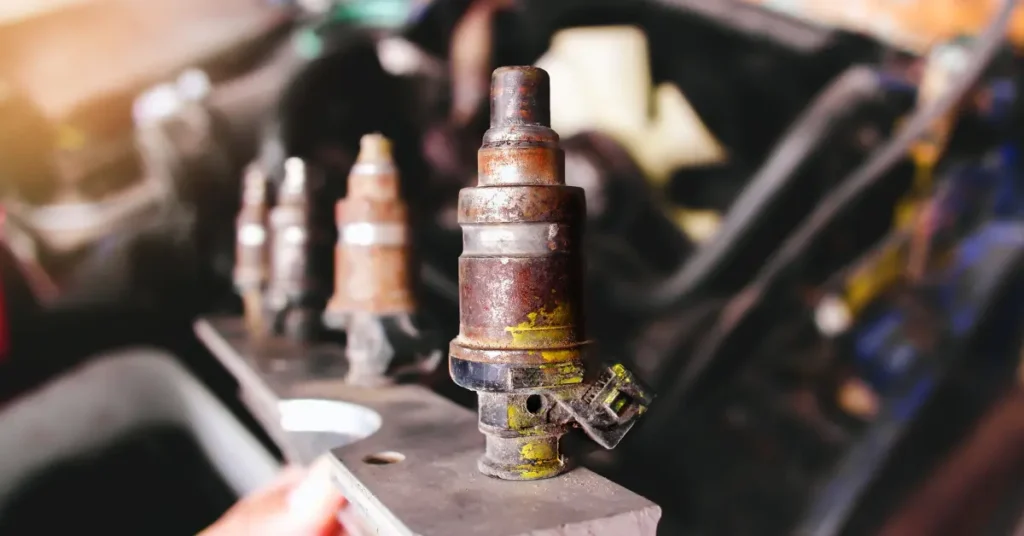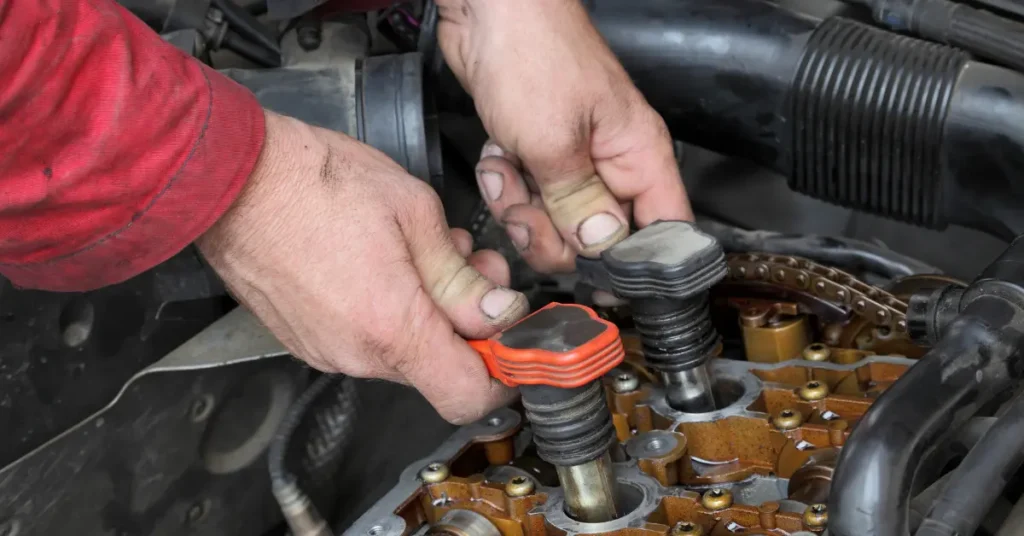
The P0300 BMW code is a common diagnostic trouble code (DTC) associated with BMW vehicles. It indicates a random misfire detected in one or more cylinders.
A misfire occurs when the fuel-air mixture in the combustion chamber fails to ignite properly, resulting in an incomplete combustion process. This can lead to poor engine performance, reduced fuel efficiency, and increased emissions.
Contents
Symptoms of P0300 BMW Code
When a BMW triggers the P0300 code, several symptoms may indicate the presence of a misfire:
Check Engine Light
The most obvious symptom is the illumination of the check engine light on the dashboard. This serves as a warning sign that there is a problem with the engine’s combustion process. When the check engine light comes on, it is important to have the vehicle diagnosed and repaired as soon as possible to prevent further damage to the engine.
Rough Idle
The engine may exhibit a rough and uneven idle. You may notice the vehicle vibrating or shaking more than usual when the engine is running at idle speed. This can be a sign that one or more cylinders are not firing properly, causing the engine to run unevenly.
Loss of Power
A misfire can cause a significant loss of engine power. You may experience a lack of acceleration or overall sluggishness while driving.
It can make it difficult to merge or overtake other vehicles safely. If you notice a sudden decrease in power, it is important to have the vehicle inspected and repaired.
Hesitation or Stumbling
When you press down on the accelerator pedal, the engine may hesitate or stumble before responding. This can be a dangerous situation, especially when merging or overtaking other vehicles. It is important to address this issue promptly to ensure safe and smooth acceleration.
Increased Fuel Consumption
A misfire can result in inefficient fuel combustion, leading to increased fuel consumption. If you notice that you are visiting the gas station more frequently than usual, it could be a sign of a P0300 code. This not only affects your wallet but also contributes to environmental pollution.
Emission Issues
Misfires can contribute to higher emissions, which can lead to a failed emissions test. If your BMW is due for an inspection, resolving the P0300 code is crucial. By fixing the misfire, you can ensure that your vehicle meets the necessary emission standards and passes the inspection.
Possible Causes of P0300 Code
To effectively diagnose and resolve the P0300 code, it’s essential to understand the potential underlying causes. Several factors can contribute to random misfires in BMW vehicles:
Spark Plug Issues
Worn-out or fouled spark plugs are a common cause of misfires. Over time, spark plugs can become dirty, leading to reduced performance and misfires. It’s important to regularly inspect and replace spark plugs according to the manufacturer’s recommended schedule.
Using high-quality spark plugs specifically designed for your BMW is crucial for optimal engine performance.
Ignition Coil Problems
Faulty or failing ignition coils can also result in misfires. These coils are responsible for generating the high voltage needed to ignite the fuel-air mixture in the combustion chamber.
When an ignition coil malfunctions, it can lead to inconsistent sparks and misfires. Regular inspection and testing of the ignition coils can help identify any issues and ensure proper functioning.
Fuel Injector Troubles

Clogged or malfunctioning fuel injectors can disrupt the precise delivery of fuel into the combustion chamber. This can cause an imbalance in the air-fuel mixture, leading to misfires.
Regular fuel system maintenance, including cleaning or replacing fuel injectors when necessary, is crucial.
Further, it is also important to use high-quality fuel and avoid contaminants that can clog the injectors.
Vacuum Leaks
Air leaks in the intake manifold or vacuum lines can introduce excess air into the combustion chamber. This disrupts the proper air-fuel mixture and can result in misfires. Thoroughly inspecting all vacuum lines and gaskets for leaks is recommended.
Proper sealing of the intake manifold and vacuum lines can prevent unwanted air from entering the combustion chamber.
Fuel System Issues
Problems with the fuel system, such as a clogged fuel filter or a failing fuel pump, can contribute to misfires. It’s important to ensure that the fuel system is functioning optimally, and that fuel is reaching the combustion chamber at the correct pressure.
Regular maintenance of the fuel system, including replacing the fuel filter as recommended by the manufacturer, can help prevent misfires.
Engine Mechanical Problems
In some cases, misfires can be caused by more significant engine mechanical issues. This could include valve problems, low compression, or a malfunctioning camshaft position sensor.
These issues typically require professional diagnosis and repair. Regular maintenance, including checking and adjusting valve clearances, can help prevent mechanical issues that can lead to misfires.
If you’re experiencing a P0300 code in your BMW, it’s crucial to understand the common culprits behind a random engine misfire.
While our article on P0300 BMW explores the specifics, you’ll find a comprehensive overview of potential causes and shared experiences across various car models in our dedicated guide to “Random Engine Misfire.”
This extensive resource sheds light on the broader context of this issue, helping you gain a deeper understanding of the challenges faced by different vehicles.
Diagnosing and Resolving P0300 Code
Diagnosing and resolving the P0300 code typically involves the following steps:
Scan for Codes
Use an OBD-II scanner to retrieve the specific code(s) stored in your BMW’s engine control module (ECM). This will confirm the presence of the P0300 code and help identify any other associated codes. It is important to use a reliable and up-to-date scanner that is compatible with your BMW’s ECM.
Inspect Spark Plugs
Check the condition of the spark plugs and replace them if necessary. Ensure that you are using the correct spark plugs recommended by BMW. Properly gapped and functioning spark plugs are essential for efficient combustion and preventing misfires.
Test Ignition Coils
Perform a thorough inspection of the ignition coils for signs of damage or wear. Test each coil individually to ensure they are functioning correctly. Replace any faulty ignition coils to ensure optimal spark generation and prevent misfires.
Check Fuel Injectors

Inspect the fuel injectors for any clogs or signs of malfunction. Consider professional cleaning or replacement if needed. Properly functioning fuel injectors are crucial for delivering the correct amount of fuel into the combustion chamber, preventing misfires.
Address Vacuum Leaks
Inspect all vacuum lines, hoses, and gaskets for leaks or damage. Repair or replace any components as necessary. Properly sealed vacuum lines and gaskets prevent the introduction of excess air into the combustion chamber, reducing the risk of misfires.
Evaluate Fuel System
Test the fuel pressure and check for any issues with the fuel pump or fuel filter. Ensure that the fuel system is delivering fuel at the correct pressure. Regular maintenance and inspection of the fuel system components can help prevent fuel-related misfires.
Consider Engine Mechanical Problems
If all other potential causes have been ruled out, it may be necessary to perform further diagnostic tests to identify any underlying engine mechanical problems.
Consulting with a qualified automotive professional or BMW dealership may be necessary to accurately diagnose and repair complex engine mechanical issues.
It’s important to note that diagnosing and resolving the P0300 code can be complex and may require expertise and specialized tools. If you are unsure or uncomfortable with performing these steps yourself, it is recommended to consult with a qualified automotive professional.
They have the knowledge and experience to accurately diagnose and repair the issue, ensuring that your BMW continues to deliver the exhilarating driving experience it is renowned for.
By addressing the underlying causes of the P0300 code and resolving any associated issues, you can restore your BMW’s performance, fuel efficiency, and overall reliability.
Regular maintenance and timely repairs are key to ensuring your BMW continues to provide a smooth and enjoyable driving experience.
FAQs
What is the P0300 code in BMW vehicles?
The P0300 code is a common diagnostic trouble code (DTC) that indicates a random misfire detected in one or more cylinders of a BMW vehicle.
What are the symptoms of the P0300 code?
The symptoms of the P0300 code in BMW vehicles may include a check engine light illumination, rough idle, loss of power, hesitation or stumbling during acceleration, increased fuel consumption, and emission issues.
What are the possible causes of the P0300 code in BMW vehicles?
The possible causes of the P0300 code in BMW vehicles can include spark plug issues, ignition coil problems, fuel injector troubles, vacuum leaks, fuel system issues, and engine mechanical problems.
How can the P0300 code in BMW vehicles be diagnosed and resolved?
The diagnosis and resolution of the P0300 code in BMW vehicles typically involve steps such as scanning for codes, inspecting spark plugs, testing ignition coils, checking fuel injectors, addressing vacuum leaks, evaluating the fuel system, and considering engine mechanical problems.
It is recommended to consult with a qualified automotive professional for accurate diagnosis and repair.



